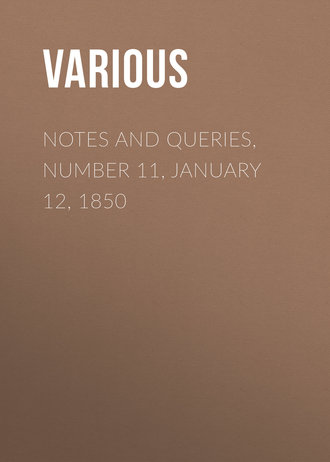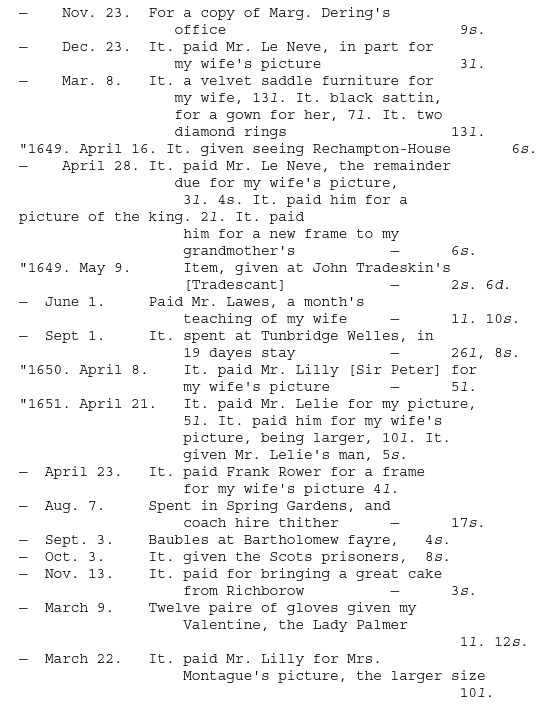
Various
Notes and Queries, Number 11, January 12, 1850
"When found, make a note of."—CAPTAIN CUTTLE.
SIR EDWARD DERING'S 1 HOUSEHOLD BOOK, A.D. 1648-52
About ten years since, I remember seeing, in the hands of a London bookseller, a curious MS. purporting to be the "Household Book of Receipts and Expences of Sir Edward Dering, Bart., of Surrenden Dering, Kent, from Lady-Day, 1648, to April, 1652." It was a think folio, in the original binding, entirely in the hand-writing of the distinguished baronet.
Sir Edward was the only son of Sir Edward Dering, the first baronet, by his second wife, Anne, daughter of Sir John Ashburnham, of Ashburnham, Sussex, Knt. He succeeded to the baronetcy upon the death of his father, in 1644, and married Mary, daughter of Daniel Harvey, Esq., of Combe, Surrey, who was brother of the famous Dr. Harvey, the discoverer of the circulations of the blood.
The volume commences at Lady-day, 1648, with the gifts of his grandmother Cramond, and his uncles Dr. Harvey and Eliab Harvey. Nov. 8. 1648, is a memorandum of receipts of "the full remainder of the three thousand pounds he was to pay me on my marriage." The receipts close March 25. 1652, with "a note of what money I have received for rent, wood, &c.; in effect, what I have to live upon, for four years, 1413l. 8s." The expenses begin at the same period; and among the earliest is, "given my wife, in gold, 100l." Under the date Aug. 4. 1648, we read, "Item: paid Mr. Edward Gibbes, to the use, and by the appointment of my sister Dorothy, it being her portion, 1200l." Dorothy was probably Sir Edward's only sister, by the same mother, Sir Edward, the first baronet's second wife. Her sun of life soon set; for Feb. 21. 1650, a whole page is occupied with items of mourning "at the death of my deare and only sister, the Lady Darell."
Independently of the frequent notices of relatives, almost serving as a family history, there are entries of high interest to the general historian and the antiquary. The costs of every article of use and virtue are set down in full, and a few of the items (which I find in my Common-place Book) will serve as a specimen of the general contents:—


The entry concerning the Celebrated Henry Lawes, Milton's Tuneful Harry, is very interesting, and is well illustrated by the following dedication, prefixed to Lawes' Second Book of Ayres and Dialogues, 1655:—
"To the Honourable the Lady Dering, Wife to Sir Edward Dering, of Surenden Dering, Bart.
"Madam,—I have consider'd, but could not finde it lay in my power, to offer this Book to any but your Ladiship. Not only in regard of that honour and esteem you have for Musick, but because those Songs which fill this Book have receiv'd much lustre by your excellent performance of them; and (which I confesse I rejoice to sepak of) some, which I esteem the best of these ayres, were of your own composition, after your noble husband was pleas'd to give the words. For (although your Ladiship resolv'd to keep it private) I beg leave to declare, for my own honour, that you are not only excellent for the time you spent in the practice of what I set, but are yourself so good a composer, that few of any sex have arriv'd to such perfection. So as this Book (at least a part of it) is not Dedicated, but only brought home to your Ladiship. And here I would say (could I do it without sadness), how pretious to my thoughts is the memory of your excellent Mother (that great example of prudence and charity), whose pious meditations were often advanc'd by hearing your voice. I wish all prosperity to your Ladiship, and to him who (like yourself) is made up of Harmony; to say nothing of the rest of his high accomplishments of wisdome and learning. May you both live long, happy in each other, when I am become ashes; who, while I am in this world, shall be ever found, Madame,
"Your Ladiship's humble Admirer "and faitnful Servant,
"HENRY LAWES."
The Derings appear to have been great lovers and patrons of music; and one of their family, Richard, practised the art as his profession. This excellent musician was educated in Italy; and, when his education was completed, he returned to England with great reputation. He resided in his own country for some time, but, upon a very pressing invitation, went to Brussels, and became organist to the convent of English nuns there. From the marriage of Charles I., until the time when that monarch left England, he was organist to the Queen. In 1610 he was admitted to the degree of Bachelor in Music at Oxford, and died in the communion of the Church of Rome, about the year 1657.
EDWARD F. RIMBAULT.
BAYSWATER AND ITS ORIGIN
A piece of topographical history was disclosed at the recent trial of a cause at Westminster, which it may be worth while to record among your "Notes." The Dean and Chapter of Westminster are possessed of the manor of Westbourne Green, in the parish of Paddington, parcel of the possessions of the extinct Abbey of Westminster. It must have belonged to the Abbey when Domesday was compiled; for, though neither Westbourne nor Knightsbridge (also a manor of the same house) is specially named in that survey, yet we know, from a later record, viz. a Quo Warranto in 22 Edward I., that both of those manors were members, or constituent hamlets, of the vill of Westminster, which is mentioned in Domesday among the lands of the Abbey. The most considerable tenant under the abbot in this vill was Bainiardus, probably the same Norman associate of the Conqueror who is called Baignardus and Bainardus in other parts of the survey, and who gave his name to Baynard's Castle.
The descent of the land held by him of the abbot cannot be clearly traced: but his name long remained attached to part of it; and, as late as the year 1653, a parliamentary grant of the Abbey or Chapter lands to Foxcrafte and another, describes "the common field at Paddington" as being "near a place commonly called Baynard's Watering."
In 1720, the lands of the Dean and Chapter in the same common field are described, in a terrier of the Chapter, to be the occupation of Alexander Bond, of Bear's Watering, in the same parish of Paddington.
The common field referred to, is the well-known piece of garden ground lying between Craven Hill and the Uxbridge road, called also Bayswater Field.
We may therefore fairly conclude, that this portion of ground, always remarkable for its springs of excellent water, once supplied water to Baynard, his household, or his cattle; that the memory of his name was preserved in the neighbourhood for six centuries; and that his watering-place now figures on the outside of certain green omnibuses in the streets of London, under the name of BAYSWATER.
E.S.
EVA, DAUGHTER OF DERMOT MACMURROUGH
Being a subscriber to Mr. O'Donovan's new translation of The Annals of the Four Masters, I beg to inform your correspondent, "A HAPLESS HUNTER" (No. 6, p. 92.), that the copy which I possess begins with the year 1172; consequently, it is hopeless to refer to the years 1135 and 1169. In 1173 the death of Mulmurry Mac-Murrough is recorded; as also of Dermot O'Kaelly, from whom the family name of Kelly is derived; but I do not find any notice of the daughter of Dermot MacMurrough.
J.I.
Oxford.
If some earlier note-taker has not anticipated me, please to inform your correspondent from Malvern Wells that the published portion of the Annals of the Four Masters, by O'Donovan, commences with the year 1172. The earlier portion of the Annals is in the press, and will shortly appear. When it sees the light, your querist will, it is to be hoped, find an answer. A query, addressed personally, to Mr. O'Donavan, Queen's College, Galway, would, no doubt, meet with a ready reply from that learned and obliging Irish scholar and historian.
J.G.
Kilkenny.
"A HAPLESS HUNTER" will find, in the Statute of Kilkenny (edited by James Hardiman, Esq., M.R.I.A. for the Irish Archaeological Society in 1843), pp. 28, 29, note, two incidental notices of Eva, daughter of Dermot McMorrough; the first, her witnessing a grant made by Richard Strongbow, Earl of Pembroke, during his lifetime; and the second, a grant made by her to John Comyn, Archbishop of Dublin, in the reign of Richard I. (at least sixteen years after her husband's death), "pro salute anime mee et domini comitis Ricardi," &c. Should he not have an opportunity of consulting the work, I shall have much pleasure in furnishing the entire extract, on receiving a line from him.
JOHN POWERS.
10. Dorchester Place, Blandford Square.
Giraldus Cambrensis mentions, that MacMurrough, having, in the year 1167, procured letters patent from Henry II., repaired to England, and there induced Strongbow, Earl of Pembroke and Strighul, to engage to aid him, on condition of receiving, in return, the hand of his eldest daughter, Eva, and the heirship of his dominions.—Girald. Camb. p. 761. And further, that Strongbow did not arrive in Ireland until the eve of St. Bartholomew's day, September, 1170; he was joined at Waterford by Eva and her father, and the marriage took place a few days after, and during the sacking of that place.—Ibid. p. 773.
"Strongbow left, by his second wife Eva, one daughter, named Isabella, an infant. * * * Richard the First gave Isabella in marriage to William de la Grace, who thus became Earl of Pembroke, and was created First Earl Marshal of England," &c.—Fenton's Hist. Pembrokeshire.
SELEUCUS.
PLAGIARISMS, OR PARALLEL PASSAGES
I have placed this title in my note-books, more than one instance of similarity of thought, incident, or expression that I have met with during a somewhat desultory course of reading. These instances I shall take the liberty of laying before you from time to time, leaving you and your readers to decide whether such similarity be the effect of accident or design; but I flatter myself that they may be accepted as parallel passages and illustrations, even by those who may differ from me in the opinion I have formed on the relation which my "loci inter se comparandi" bear to each other.
In Lady Blessington's Conversations with Lord Byron, pages 176, 177., the poet is represented as stating that the lines—
"While Memory, with more than Egypt's art,
Embalming all the sorrows of the heart,
Sits at the altar which she raised to woe,
And feeds the source whence tears eternal flow!"
suggested to his mind, "by an unaccountable and incomprehensible power of association," the thought—
"Memory, the mirror which affliction dashes to the earth, and, looking down upon the fragments, only beholds the reflection multiplied."
afterwards apparently embodied in Childe Harold, iii. 33.
"Even as a broken mirror, which the glass
In every fragment multiplies; and makes
A thousand images of one that was,
The same, and still the more, the more it breaks."
Now, Byron was, by his own showing, an ardent admirer of Burton's Anatomy of Melancholy. See Moore's Life of Byron, vol. i. page 144. Notices of the year 1807.
Turn to Burton, and you will find the following passage:—
"And, as Praxiteles did by his glass, when he saw a scurvy face in it, brake it to pieces, but for that one, he saw many more as bad in a moment."—Part 2. sect. 3. mem. 7.
I am uncharitable enough to believe that Childe Harold owes far more to Burton, than to "the unaccountable and incomprehensible power of association."
MELANION.


